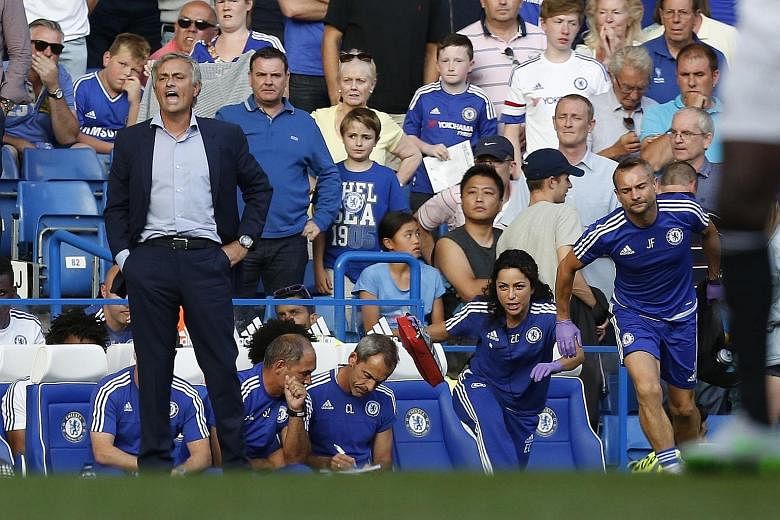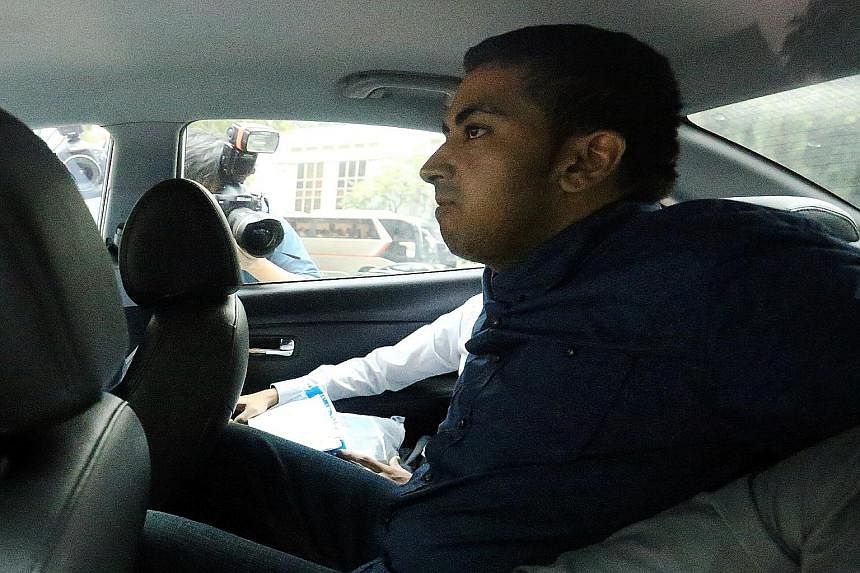On the face of it, there would not appear to be much in common with Jose Mourinho and Yogvitam Pravin Dhokia.
Mourinho is known to us all as a football manager who flaunts the rules with monotonous regularity, and probably has enough credit in the bank to shrug off anything the authorities might do to try to bring him into line.
The Portuguese is famous for being infamous.
The Briton is the previously anonymous man whose jaywalking on the track during last Sunday's Formula One race around Marina Bay sees him remanded in prison because nobody stepped forward to meet his bail.
But both appear to act on impulse and disregard the rights and feelings of others.
We do not yet know why Dhokia climbed onto the street circuit and put his own life and that of the drivers at risk. Once he has his day in court, one way or another the law will decide how tough it needs to make a deterrent.
Turn 13 will somehow determine his life.
F1 is not Dhokia's judge and jury. The court must be - just as other courts dealt out punishment to Neil Horan, the kilted Irishman who went for a walkabout on the circuit at Silverstone during the 2003 British Grand Prix, and Trenton Oldfield, who sabotaged the 2012 Oxford versus Cambridge University Boat Race by swimming in the Thames as the crews raced flat out.
Oldfield, an Australian who claimed his stunt was a protest against public school elitism in England, was sentenced to six months' imprisonment.
Horan, a defrocked priest, was treated to two months in one of Her Majesty's prisons. It failed to deter him: He was subsequently arrested again after knocking over a Brazilian marathon runner at the 2004 Athens Olympics and was intercepted by security forces at both the 2006 football World Cup in Germany and a London Marathon.
Oldfield claimed he was following his conscience as a civil rights fighter. Horan spoke of doing the Lord's work. You might consider they are, at best, public nuisances, publicity seekers or have a screw loose.
I wouldn't possibly comment, other than to observe that, for the safety of the sportsmen or women they targeted, or simply for the enjoyment of global audiences, they deserve whatever the courts deem it pertinent to do to deal with them.
Mourinho is a serial offender of a different kind.
He, too, courts publicity off the backs of other people's sporting prowess. In his case, there is often a calculated gain because, the more controversy he stirs, the more headlines he generates, the more that some multinational companies pay him over and above his Chelsea salary.
No such thing as bad publicity?
Maybe in some circles it appears that way. There are broadcasters and newspaper reporters who are drawn to his flame, either because they think he is a charmer or because he is the easiest headline around.
The leading European referees' official a few years ago referred to Mourinho as "an enemy of football".
That was after his false accusations prompted Swedish referee Anders Frisk to retire from the sport he loved, following Mourinho's utterances about Frisk and the then Barcelona coach Frank Rijkaard having conspired at half-time to get Chelsea eliminated from the Champions League.
The claim was baloney. But I can tell you categorically, having visited Frisk at his home at the time, that the death threats phoned, in English, to the referee and his children were chilling and real.
Mourinho never apologised for his insinuation.
He likewise neither apologises nor climbs down over his rant at the Chelsea club doctor Eva Carneiro who, along with the physiotherapist, ran to give first aid to Eden Hazard six weeks ago.
Mourinho claimed that everyone and everything on his bench, including the medical staff, are his responsibility. He accused Carneiro and the physio of being naive and impulsive in rushing to do precisely what medics are there to do - to treat a player in apparent distress.
Anyone could see, said Mourinho, that Hazard was not badly injured.
No? Then why was he lying prone on the pitch, calling out in agony? Surely the manager is not implying that his player was feigning injury?
Questions without answers. Dr Carneiro has not worked on the Chelsea bench since and is now seeking legal redress, most likely for constructive dismissal.
It seems that no one at Chelsea has the power or the desire to rein in Mourinho. Had he said this was touchline wrath, a moment of misjudgment by a manager under pressure, all might have been negotiable.
Nothing of that kind has been forthcoming. The Special One might not have it in him to admit he might be wrong, and it happened before when he accused the Reading ambulance service of failing to get goalkeeper Petr Cech to hospital on time after his serious head injury.
The ambulance service's official log showed its response was rapid enough, just as soon as Chelsea agreed the need was urgent.
People from Fifa's medical officer Michel d'Hooghe to civil and women's rights activists want explanations from Chelsea. The case is potentially more harmful than the current outcry after Diego Costa got Arsenal's Gabriel Paulista sent off last week.
If the doctor has done something so wrong that Chelsea no longer believe her to be suitable for the role, then it is in everyone's interest for the truth to come out.
Not even Mourinho is so special that he and he alone can decide whether a player needs treatment or not.
Loose cannons are a danger in the managerial dug-out, just like an intruder on the track.



